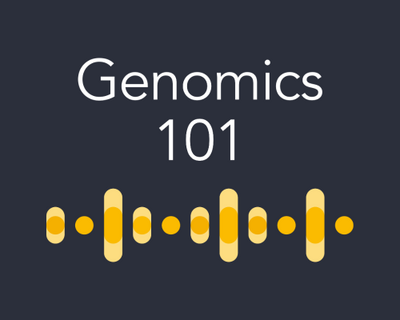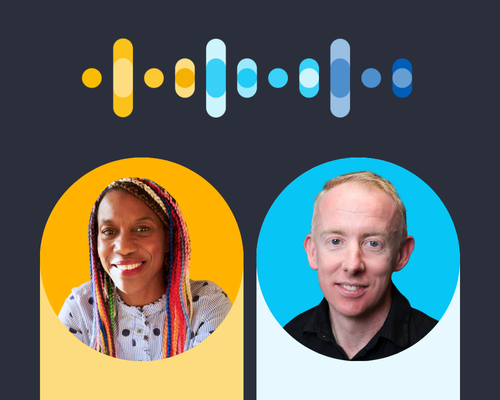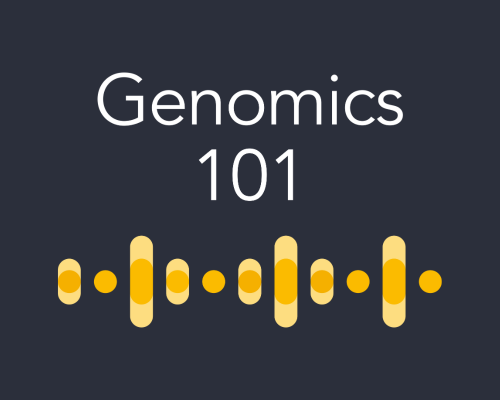
What is a clinical geneticist?
In this explainer episode, we’ve asked Dr Nour Elkhateeb, clinical fellow at Genomics England and clinical geneticist for the NHS, to explain the role of a clinical geneticist.
The previous episode mentioned in the conversation is linked below.
You can also find a series of short videos explaining some of the common terms you might encounter about genomics on our YouTube channel.
If you’ve got any questions, or have any other topics you’d like us to explain, let us know on [email protected].
You can download the transcript or read it below.
Florence: What is a clinical geneticist? My name is Florence Cornish and I'm here with Nour Elkhateeb, clinical geneticist for the NHS and fellow at Genomics England, to find out more.
So, Nour, before we dive into talking about clinical geneticists, could you explain what we mean by the term genetics?
Nour: Hi Florence, so at its heart, genetics is the study of our genes and how they are passed down through families. Think of your genome as a huge, incredibly detailed instruction manual for building and running your body. This manual is written in a specific language, DNA, which is made up of millions of letters arranged in a specific order.
And here is the interesting part, we all have tiny differences in our genetic spelling, which is what makes each of us unique.
But sometimes a change in the instructions, a spelling mistake in a critical place, can affect health. Genetics is all about learning to read that manual, understand how changes in it can cause disease, how it's passed down through families and finding ways to help.
Florence: And so, what kind of thing does a geneticist actually do?
Nour: Well, the term geneticist can cover a few different roles, which often work together. Crudely speaking, you can think of two main types, laboratory geneticists and clinical geneticists.
Laboratory geneticists are the incredible scientists who work behind the scenes. When we send a blood sample for genomic sequencing, they are the ones who use amazing technology to read the billions of letters in that person's instruction manual. The job is to find the one tiny spelling mistake among those billions of letters that might be causing a health problem.
Clinical geneticists like me are medical doctors specialised in the field of genetics, and we work face-to-face with patients and families in a hospital or a clinic setting. You can think of us as the bridge between the incredibly complex science of the genomics lab and the real-life health journey of the person in front of them. We diagnose, manage and provide support for individuals and families who are affected by or at risk of genetic conditions. And we translate that complex genetic information into meaningful information for the patient, the family and the other doctors as well.
Florence: So, let's talk a little bit more about clinical geneticists. What stage of someone's genomics journey are they likely to see you? What are some typical reasons they might get referred, for example?
Nour: That's a really good question. So, people actually can be seen by clinical geneticists at almost any stage of life, and for many different reasons. Let me give you some examples.
We see a lot of babies and children. A family may be referred to us if their baby is born with health problems that do not have a clear cause, or if a child is not developing as expected. And sometimes families may have been searching for answers for years, or what we call a diagnostic odyssey, but no one has been able to find a single unifying diagnosis to explain their challenges. And our job is to see if there is a genetic explanation that can connect all the dots.
Florence: You touched there on the diagnostic odyssey, and I know we don't have time to dive into that right now, but if listeners want to learn more about this, then they can check out our previous Genomics 101 podcast: What is the Diagnostic Odyssey?
So, Nour, we know that you see children and families in their genomics journeys. Do you see adults as well?
Nour: Yes, indeed. We also see many adults who develop certain health conditions, such as cancer or certain types of heart disease, and their clinicians suspect they might be having an underlying inherited genetic cause, or it could be actually someone who is healthy themselves, but have a family history of a particular condition, and want to understand their own risk or the risk for their children and other family members.
A classic example is in cancer genetics. A woman with breast cancer at a young age, or who has several family members who have also had it, she would be investigated to see if she carries a gene change that increases the risk of breast cancer and other cancers, and finding that actually would be critical for the treatment choices, and it has huge implications for her relatives.
Also, a major part of our work is in the prenatal setting, so we might see a couple during a pregnancy if the antenatal ultrasound scan, for example, shows that the baby has abnormalities. And the obstetrician might refer them to us to investigate if they have an underlying genetic reason for that. And this can help the couple and the medical team prepare for any challenges after birth and also make informed decisions about the pregnancy.
And clinical genetics is unique in that we don't see just individual patients, we often work with entire families, and if there is an inherited condition in the family, it's not unusual for several relatives across different generations to be seen by our team.
This family-wide approach helps us piece together the inheritance pattern and offer the right tests to the right people, and also ensure that everyone who might benefit from information or screening has the opportunity to access that.
Florence: So if someone has a suspected genetic condition, will they always come to you first?
Nour: Actually no, the way people come to us is changing. It used to be that you would always see clinical geneticists first, but now with genetic testing becoming more common, other clinicians like a cardiologist, a neurologist, or a paediatrician, might order a genetic test themselves.
But these tests can produce a huge amount of data, and the results are not always a simple yes or no. Sometimes the lab finds something called a variant of uncertain significance, which means a gene change that we are not certain whether it is the cause of health problems or not. And in these cases, a specialist will refer the patient to us to help put the uncertain result into the context of the patient's specific health problems, and family history, and to help also work out what it really means for them and their family.
Florence: So, you mentioned a couple of other healthcare professionals there, paediatricians and neurologists for example. Are there any other roles that you work closely with as a clinical geneticist?
Nour: Well, genetics is never a one-person job, and it's rather like a team sport, so we never work in isolation. We work in what we call a multidisciplinary team, where clinical geneticists, genetic counsellors, genomic practitioners, scientists and other specialists, all bring our knowledge and expertise together. We also work directly with other specialists across the hospital and the NHS.
Let's say if it's a genetic heart condition, a cardiologist would be a key part of this multidisciplinary team for the patient. And this 360-degree view ensures that we are giving the best possible holistic care.
Florence: And finally, before we wrap up, I'm sure lots of our listeners may have heard or even come across genetic counsellors. Could you explain how this role is different from a clinical geneticist?
Nour: So, our role as a clinical geneticist is distinct from that of a genetic counsellor, but we work side by side. Clinical geneticists, as the medical doctors on the team, we're often focused on the diagnosis, and we will perform a physical examination of the patient, looking for subtle clues. We will review their medical history, and piece together the whole medical puzzle. And based on that, we decide which genetic test is the most appropriate, and we'll have the best chance of finding an answer.
A genetic counsellor is a healthcare professional with highly specialised training in both genetics and counselling. They are communication experts, they spend time helping families understand results, process the information, and think through what it means for them and their relatives.
They are incredibly skilled at explaining complex genetic concepts in a way that is easy to understand, and also at providing support. They help families navigate the emotional impact of what can be life-changing news, and also discuss the implications for the wider family. And genetic counsellors are not only there after the diagnosis is made, they can also play an active role in the diagnostic process.
So in many situations, they are the ones taking the detailed family history, recognising patterns that suggest a genetic condition, and arrange the most appropriate genetic tests. They work closely with laboratory scientists and clinical geneticists to interpret the results and guide the next steps for the patient.
And a family will often see both of us as our roles complement each other.
Florence: So, we'll finish there. Thank you so much, Nour, for sharing what you do as a clinical geneticist.
If you'd like to hear more explainer episodes like this, you can find them on our website at www.genomicsengland.co.uk, or wherever you get your podcasts. Thank you for listening.

